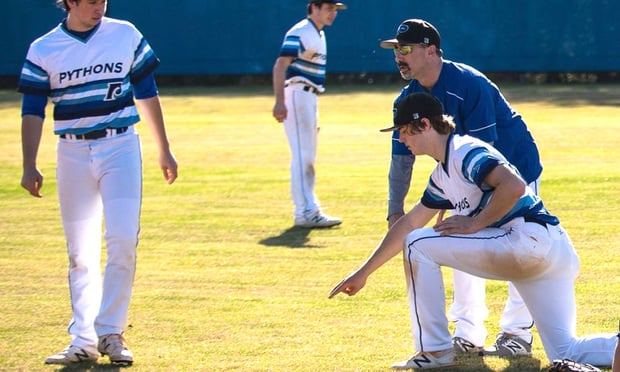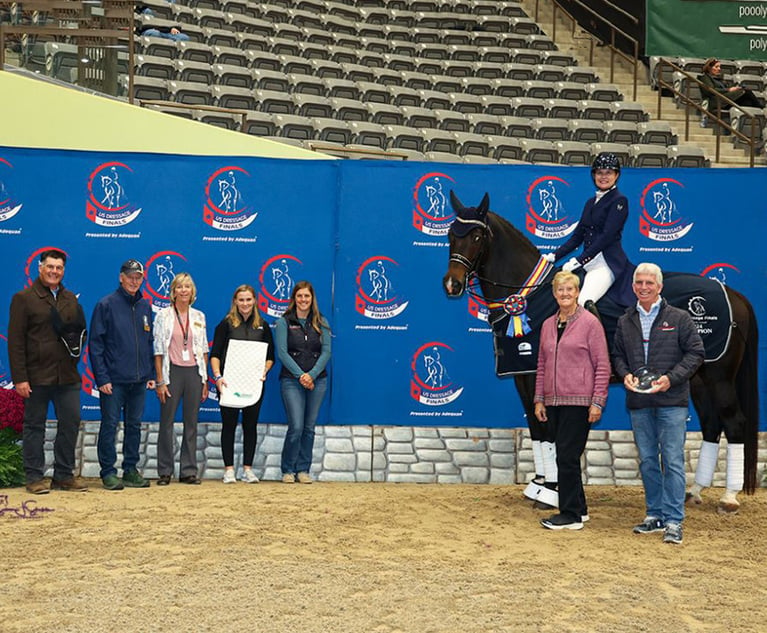Baseball's 'Pitching Ninja' on Big Law, Spotting Talent and Why the Billable Hour Is for Suckers
Over the years, Rob Friedman moved away from the law and closer to baseball.
August 15, 2019 at 01:48 PM
5 minute read
 Rob Friedman (in sunglasses) known as the "Pitching Ninja." (Courtesy photo)
Rob Friedman (in sunglasses) known as the "Pitching Ninja." (Courtesy photo)
If you follow baseball or read The Wall Street Journal, you have most likely heard Rob Friedman's name come up in the last couple of weeks. Friedman, a former Big Law lawyer turned technology entrepreneur who's known on social media as the "Pitching Ninja," is credited with helping "regular guy" Nathan Patterson, a 23-year-old software salesman, get a minor league contract with the Oakland A's.
Patterson hit 96 mph on a speed gun during a rain delay at a Colorado Rockies game and the video went viral. He had already received coaching from Friedman, played in an amateur men's league and gone through plenty of training. After Patterson was able to secure the contract, he thanked a number of people via Instagram, including Friedman.
For those who are baseball nuts, Friedman has been on the radar for a while. His social media accounts are dedicated to teaching proper pitching mechanics, showing some of the nastiest pitches from the previous day in Major League Baseball (his account was suspended in April 2018 by MLB for unauthorized clip usage; he was reinstated a couple of days later after smoothing it out with them) and trying to give a platform to young athletes who might not have the cash to attend showcases or pitching camps. He has about 150,000 followers on Twitter, including several professional athletes and media members.
In addition to doling out what he describes as free baseball wisdom, the Atlanta-based Friedman has some knowledge of the law as well: He worked as an M&A and technology attorney in law firms and corporate legal departments for several years, including stints with Kilpatrick Townsend & Stockton and Schnader Harrison Segal & Lewis in Atlanta, and as general counsel for a telecommunications company called Arris and senior counsel in Nortel Networks' broadband group.
He's now an executive at a technology company he founded in the Atlanta area, which he asked not to be named.
It's not a common overlap, so The American Lawyer caught up with Friedman to talk about how he managed to forge this niche, why he left Big Law and what hopes he has for his baseball platform in the future. This interview has been edited and condensed for clarity.
Why did you leave Big Law?
I didn't know a lot about what lawyers actually did when I decided to go to law school. It seemed like a good career choice, and I liked the idea of being a lawyer, so I went to law school. My wife is a lawyer and I love the idea of thinking like an attorney, and law school prepares you to think in a certain way. But one thing I didn't like was that I was fundamentally opposed to the concept of you are worth how many hours you work. People using it as a badge of honor: "Well, I worked 70 hours last week." Shouldn't you be more excited if you got the job done more quickly?
That lead me to an inside counsel role, which I loved. I wasn't at the whims of a client and had control over my day. But this was back in the internet heyday, and I also think of myself as a businessman, so in 1999 I started my own company. I am still an attorney, but I generally don't bring it up.
How does a lawyer/businessman end up becoming an arm mechanics expert who champions underserved pitching talent on Twitter?
I've always been a big baseball fan. I loved playing, but I wasn't great. After my wife and I had our kid, I wanted to teach the game to him, but I wanted to teach it better than how it was taught to me. So I asked a lot of questions of coaches and experts. A legal background is great for stuff like that; knowing how to see through fake advertisements for training videos or taking apart positions and finding out what the truth was.
Eventually I had all this knowledge and I wanted to share it, so I started putting it online and developed a following. It was me just sharing stuff I saw. Now I have professional players following me and getting excited if they are mentioned in my feed.
Your latest venture is Flatground. What is that?
It's my way of trying to democratize baseball. It [baseball] can be a rich kid's game, and some kids, either via geography or financial hardship, don't get a chance to be looked at. Or they grow later or have a bad day at a tryout. This gives them the opportunity to be seen. I see it as sort of an eBay for baseball: allowing people to find talent they otherwise would not have and giving the talent a place to showcase.
Read More Here:
How Kirkland's Javier Rubinstein Won a Rematch for Sanctioned Tennis Pro Anna Tatishvili
Tampa Bay Rays Prospect Scores Clerkship With Clarence Thomas
This content has been archived. It is available through our partners, LexisNexis® and Bloomberg Law.
To view this content, please continue to their sites.
Not a Lexis Subscriber?
Subscribe Now
Not a Bloomberg Law Subscriber?
Subscribe Now
NOT FOR REPRINT
© 2025 ALM Global, LLC, All Rights Reserved. Request academic re-use from www.copyright.com. All other uses, submit a request to [email protected]. For more information visit Asset & Logo Licensing.
You Might Like
View All
Wachtell Helps Miami Dolphins Secure One of NFL’s First Private Equity Deals
3 minute read
'It Refreshes Me': King & Spalding Privacy Leader Doubles as Equestrian Champ
5 minute readTrending Stories
- 1Apply Now: Superior Court Judge Sought for Mountain Judicial Circuit Bench
- 2Harrisburg Jury Hands Up $1.5M Verdict to Teen Struck by Underinsured Driver
- 3Former Director's Retaliation Suit Cleared to Move Forward Against Hospice Provider
- 4New York Judge Steps Down After Conviction for Intoxicated Driving
- 5Keys to Maximizing Efficiency (and Vibes) When Navigating International Trade Compliance Crosschecks
Who Got The Work
J. Brugh Lower of Gibbons has entered an appearance for industrial equipment supplier Devco Corporation in a pending trademark infringement lawsuit. The suit, accusing the defendant of selling knock-off Graco products, was filed Dec. 18 in New Jersey District Court by Rivkin Radler on behalf of Graco Inc. and Graco Minnesota. The case, assigned to U.S. District Judge Zahid N. Quraishi, is 3:24-cv-11294, Graco Inc. et al v. Devco Corporation.
Who Got The Work
Rebecca Maller-Stein and Kent A. Yalowitz of Arnold & Porter Kaye Scholer have entered their appearances for Hanaco Venture Capital and its executives, Lior Prosor and David Frankel, in a pending securities lawsuit. The action, filed on Dec. 24 in New York Southern District Court by Zell, Aron & Co. on behalf of Goldeneye Advisors, accuses the defendants of negligently and fraudulently managing the plaintiff's $1 million investment. The case, assigned to U.S. District Judge Vernon S. Broderick, is 1:24-cv-09918, Goldeneye Advisors, LLC v. Hanaco Venture Capital, Ltd. et al.
Who Got The Work
Attorneys from A&O Shearman has stepped in as defense counsel for Toronto-Dominion Bank and other defendants in a pending securities class action. The suit, filed Dec. 11 in New York Southern District Court by Bleichmar Fonti & Auld, accuses the defendants of concealing the bank's 'pervasive' deficiencies in regards to its compliance with the Bank Secrecy Act and the quality of its anti-money laundering controls. The case, assigned to U.S. District Judge Arun Subramanian, is 1:24-cv-09445, Gonzalez v. The Toronto-Dominion Bank et al.
Who Got The Work
Crown Castle International, a Pennsylvania company providing shared communications infrastructure, has turned to Luke D. Wolf of Gordon Rees Scully Mansukhani to fend off a pending breach-of-contract lawsuit. The court action, filed Nov. 25 in Michigan Eastern District Court by Hooper Hathaway PC on behalf of The Town Residences LLC, accuses Crown Castle of failing to transfer approximately $30,000 in utility payments from T-Mobile in breach of a roof-top lease and assignment agreement. The case, assigned to U.S. District Judge Susan K. Declercq, is 2:24-cv-13131, The Town Residences LLC v. T-Mobile US, Inc. et al.
Who Got The Work
Wilfred P. Coronato and Daniel M. Schwartz of McCarter & English have stepped in as defense counsel to Electrolux Home Products Inc. in a pending product liability lawsuit. The court action, filed Nov. 26 in New York Eastern District Court by Poulos Lopiccolo PC and Nagel Rice LLP on behalf of David Stern, alleges that the defendant's refrigerators’ drawers and shelving repeatedly break and fall apart within months after purchase. The case, assigned to U.S. District Judge Joan M. Azrack, is 2:24-cv-08204, Stern v. Electrolux Home Products, Inc.
Featured Firms
Law Offices of Gary Martin Hays & Associates, P.C.
(470) 294-1674
Law Offices of Mark E. Salomone
(857) 444-6468
Smith & Hassler
(713) 739-1250












